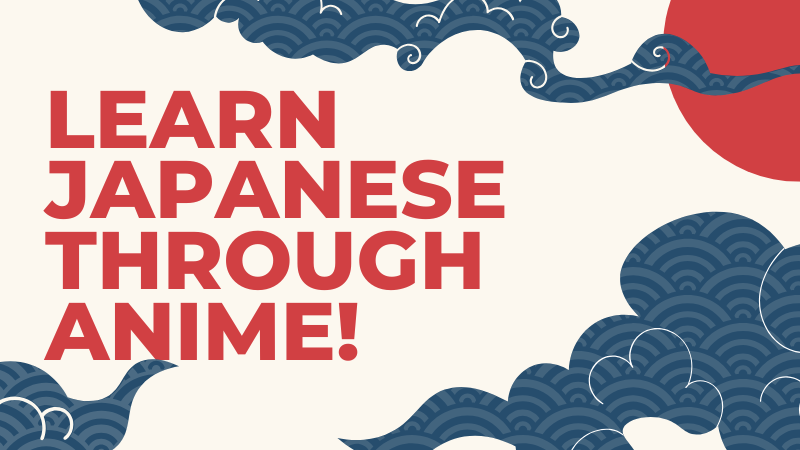Learn Japanese Through Anime! 10 Everyday Phrases You Can Actually Use
2025.06.17投稿

1. Introduction: Why Learn Japanese from Anime?
Anime is not just entertainment—it’s also an amazing language learning tool. The characters use real conversational Japanese, filled with emotions, slang, and cultural expressions that textbooks often miss. By paying attention to the words and how they’re used, you can naturally improve your listening skills and vocabulary.
In this article, we’ll introduce 10 Japanese phrases commonly used in anime that you can also use in everyday life!
2. Phrase 1: 「行ってきます!」 (Ittekimasu!) – “I’m off!”
You’ll often hear this phrase when a character leaves home. It’s a polite way to say, “I’m going now,” usually used before heading to school or work.
Example from anime:
Used by students in slice-of-life anime like Clannad or Your Name when leaving the house.
When to use it:
When leaving home and expecting to return later.
3. Phrase 2: 「大丈夫?」 (Daijoubu?) – “Are you okay?”
This phrase expresses concern or checks if someone is alright. It can be used emotionally, physically, or even casually when someone makes a mistake.
Example from anime:
Heard frequently in emotional moments, like in My Hero Academia when characters get injured.
When to use it:
When someone looks unwell, sad, or makes a mistake.
4. Phrase 3: 「マジで?」 (Maji de?) – “Seriously?”
A casual way to express surprise or disbelief. It’s often used among friends and shows up in many modern anime.
Example from anime:
Characters like Haruhi in The Melancholy of Haruhi Suzumiya or Naru in Barakamon use this often.
When to use it:
When something surprising or unbelievable happens.
5. Phrase 4: 「やったー!」 (Yatta!) – “I did it!” or “Yay!”
A cheerful phrase expressing happiness, success, or excitement. Kids and adults both use it.
Example from anime:
Used by Naruto in Naruto or Usagi in Sailor Moon after winning or overcoming a challenge.
When to use it:
After succeeding or hearing good news.
6. Phrase 5: 「うそでしょ!」 (Uso desho!) – “No way!” or “You’re kidding!”
An expression of shock or disbelief, often when something unexpected or unfair happens.
Example from anime:
Common in dramatic scenes like in Attack on Titan when things take a dark turn.
When to use it:
When reacting to shocking or unexpected news.
7. Phrase 6: 「頑張って!」 (Ganbatte!) – “Good luck!” or “Do your best!”
A supportive phrase used to encourage someone. It’s polite, friendly, and one of the most iconic Japanese expressions.
Example from anime:
Used by friends or coaches in Haikyuu!!, Free!, and many sports anime.
When to use it:
When someone is about to face a challenge or start something difficult.
8. Phrase 7: 「お疲れさま」 (Otsukaresama) – “Good job” / “Thanks for your hard work”
A unique phrase in Japanese culture used to acknowledge someone’s effort. It’s commonly used in the workplace or after group tasks.
Example from anime:
Seen in office settings like Aggretsuko, or after battles in shows like Bleach.
When to use it:
After someone finishes work, practice, or anything tiring.
9. Phrase 8: 「なんでやねん!」 (Nandeyanen!) – “What the heck?!” (Kansai dialect)
A funny, exaggerated phrase used as a comedic punchline, especially in Kansai-based characters.
Example from anime:
Characters from Osaka like Azumanga Daioh’s Ayumu often use this for comedic effect.
When to use it:
In a funny or joking context when someone says or does something silly.
10. Phrase 9: 「ちょっと待って!」 (Chotto matte!) – “Wait a second!”
A phrase used to pause someone or a situation. Very useful in daily conversation.
Example from anime:
Heard in fast-paced scenes like One Piece or Demon Slayer, when a character needs to stop someone urgently.
When to use it:
When you want someone to hold on or wait a moment.
11. Phrase 10: 「大丈夫、きっとうまくいくよ」 (Daijoubu, kitto umaku iku yo) – “Don’t worry, it’ll all work out.”
A warm and reassuring phrase often used by caring characters. Great for expressing hope and comfort.
Example from anime:
Often used in heartwarming scenes like in Spirited Away or Your Lie in April.
When to use it:
To encourage or comfort someone who is feeling down.
12. Conclusion: Boost Your Japanese Naturally Through Anime!
Anime is a treasure trove of real, expressive Japanese. By listening to these common phrases and trying to use them yourself, you’ll not only improve your language skills but also deepen your understanding of Japanese culture.
Tip: Next time you watch anime, turn on the Japanese subtitles and keep a notebook nearby. Learn the phrases, repeat them out loud, and have fun!